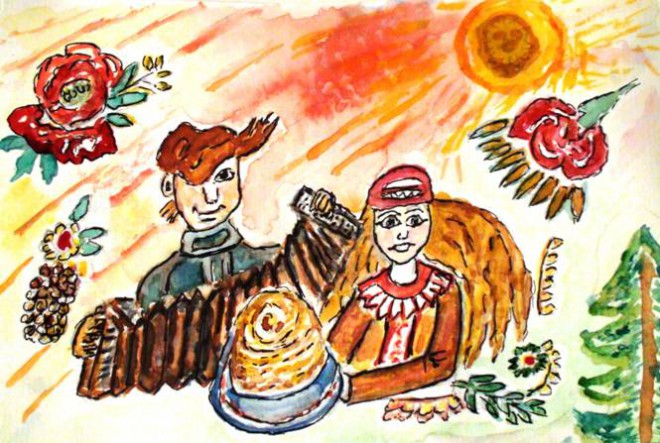All over the world, we celebrate the departure of winter and the arrival of spring with different customs. In Russia, for this purpose, they celebrate the Maslenitsa holiday, which lasts for a whole week, this year from February 16 to 22. The unknown Russian carnival, along with other Russian jokes and customs, is brought to us in an interesting way by a book from the collection Tales of Russian Life by Linguarus Publishing House, which, in addition to the cultural background, is also aimed at learning the Russian language, as it is written in both Slovenian and Russian.
Russian Carnival - Maslenitsa
It's a buttercup the oldest surviving Russian holiday, as archaeological evidence indicates that it was celebrated as early as the 2nd century AD. The week-long celebration marking the beginning of spring was one of the most important and elaborate in pagan culture; a fact that is not surprising given the six-month long Russian winter.
With the beginning of Lent, it also begins a period of strict dieting, which prohibits the consumption of meat, fish, dairy products and eggs. During this time, it is also necessary to refrain from parties, secular music, dancing and other distractions from the spiritual life. Therefore, the buttercup represents the last opportunity to flirt with worldly pleasures. The food typical of this period is ti blinis (pancakes) that represents symbol of the sun, personifies the ancient and powerful god Volos. Butter pancakes they are round and golden like the sun and contain rich ingredients that are still allowed at this time - butter, eggs and milk. In addition to making and eating huge amounts of pancakes, the ancient Russian celebration of Maslenitsa included masquerades, sledding, sledding, games on swings, and horse-drawn sleigh rides. Linguistic evidence suggests that maslenica ("butterfly week") was ceremonially called "myasopusta" ("meatless" - although the word is now archaic).

Shrovetide week
Buttermilk is celebrated every year in the week before Lent (40 days before Easter) and each day is dedicated to special customs. On Monday, they welcome the buttercup woman and give her a welcome, the day is also known as "Meeting the buttercup woman". At that time, they make a figure out of straw (it has several names, Buttercup Lady, Chuchelo, Figure of Winter...), which they dress in women's clothes and take it through the village with a sleigh, accompanied by singing.
Tuesday it is called "Games Day" and is especially aimed at young people. From that day on, the whole village began to engage in various activities. In the old days, young boys and girls used to go down the white slopes and go sledding. Of course, they also ate pancakes. The third day of the buttercup is named symbolically "Sweet Day".
Wednesday - a snack – opened feasts in homes with pancakes and other dishes. Every household had tables covered with delicious food, baked pancakes and brewed beer.
Thursday is full of games and fun "Thursday Celebration". There is supposed to be a lot of eating on this day, because the buttercup is followed by Lent, which lasts 40 days until Easter. In old Russia, this was the time when winter supplies began to run out and people had to limit their food intake. If on Wednesday the sons-in-law were treated to pancakes at their mothers-in-law's homes, on Friday it was time for them to arrange a pancake evening. The day before, when the mothers-in-law visited the sons-in-law, they had to send everything necessary for making pancakes to their home - pans, ladles, etc. The in-laws provided a bag of buckwheat flour and some butter. If the sons-in-law did not respect the tradition, it was considered very intolerable and offensive and could be a reason for lifelong hatred. But the Maslenitsa celebrations are even more powerful during the weekend.
Saturday was a day dedicated to relatives visiting young wives or newly married brides. The last Sunday of Shrove Tuesday is called Proščenska in Russian (in Slovenia it is Ash Wednesday). People asked each other for forgiveness for all their grievances and problems. The day is dedicated to unity and joy. On the last day of the carnival, the most interesting event took place in the evening - farewell to the carnival - the ceremonial burning of a straw figure of Winter. As befits a sun festival, fire provides the last glorious moment. People threw the leftovers of baked pancakes and food on a huge bonfire and explained to the children that all the nutritious food had disappeared in the fire because it was time to prepare for Lent. Maslenica ended with the first day of Lent - Clean Monday, which was considered a day of purification of all sins and food forbidden during Lent. On Maundy Monday, people bathed in a bath, women cleaned dishes, washed them of grease and the remains of forbidden food.
Maslenica Festival every year it also takes place in Ljubljana, this year it is celebrated on Saturday, 21. 2. on Pogačarjev trg in Ljubljana. But since we eat pancakes for the buttercup and because they symbolize the sun and ward off cold and winter with their shape and color, we have prepared a traditional recipe for them.
Recipe for Russian pancakes
Ingredients for the dough:
- 1 liter of milk
- 200 g of flour
- 3 eggs
- Pinch of salt
- A tablespoon of sugar
- A tablespoon of vegetable oil
Preparation: Mix eggs and sugar. Mix the flour into the milk, add salt and vegetable oil and a mixture of eggs and sugar. Mix well. Grease the pan with oil and heat well. Pour a small ladleful of the prepared pancake batter into the pan so that the batter covers the bottom of the pan. Meanwhile, prepare another pan of the same dimensions. Lubricate it with oil and heat it. Flip the prepared pancake from the first pan into the second one with the baked side up. The pancake is ready. Put it on a plate, spread it with butter. The batter is enough for 15-20 pancakes, depending on the size of the pan.






